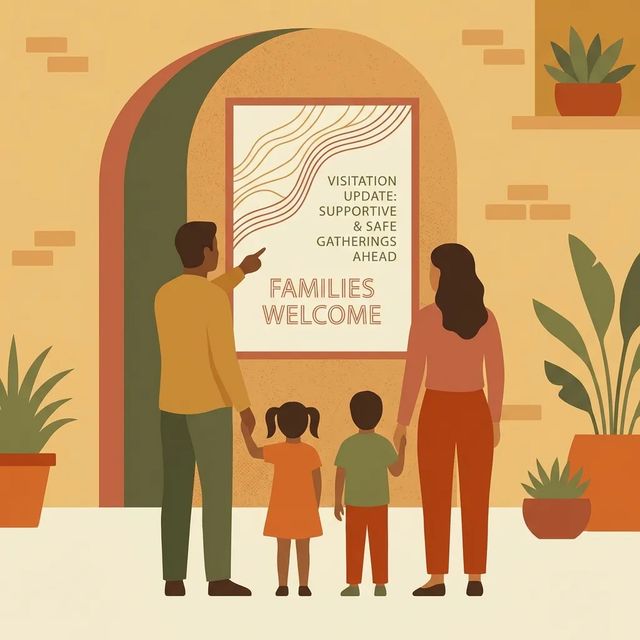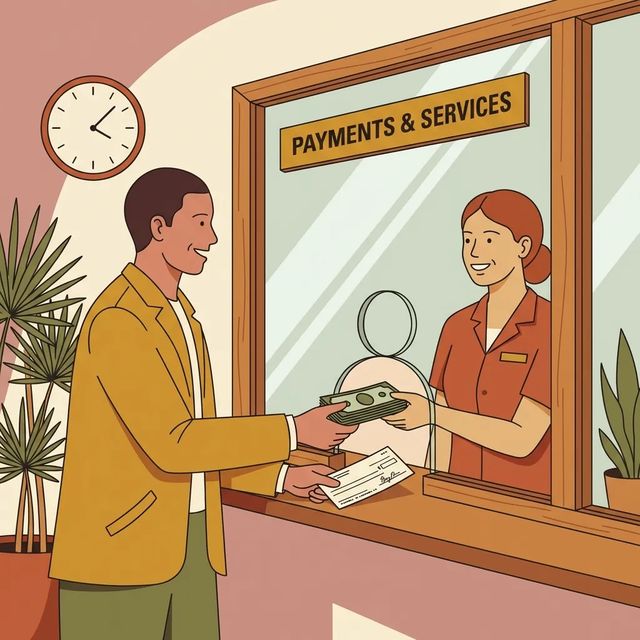Edgecombe Youth Center, Rocky Mount
Explore
Find an Inmate at Edgecombe Youth Center, Rocky Mount
Search for a loved one and send messages and photos in minutes.

Guides for This Facility

How to Visit Facility
If you're trying to visit someone connected to the Cabarrus Youth Development Center, start here. The rules are stricter than most people expect.
Read Guide
How to Contact an Inmate at Facility
Getting in touch is easier once you know exactly where the person is housed and who to contact. Use the facility address to confirm the right site, then reach out to the facility director for current instructions on calls, mail, and visits.
Read Guide
How to Send Money to Facility
If you're sending money to cover copies or other materials from hearing records, expect a possible fee. The Department may charge a fee to cover material costs, but the specifics (the exact amount, accepted payment methods, who to make payment out to, and where to send it) aren't included in the available information. Confirm all of those details before sending any payment.
Read GuideAt a Glance
Visitation
- You usually must be on the incarcerated person’s approved visitor list before visiting.
- Visitor application forms are typically requested by the incarcerated person and mailed to prospective visitors to complete and return.
- Facilities in North Carolina may offer both in‑person and video visits; availability and hours vary by facility.
Communication
- Edgecombe Youth Center is a 44‑bed male facility located at 78 Positive Way, Rocky Mount, NC.
- Facility director information for Edgecombe Youth Center is listed in the facility record.
- Most inmate communication services (calls, video, messaging) are provided through third‑party vendors rather than directly by the facility.
Sending Money
- Common deposit methods include online/mobile apps, phone deposits, walk-in kiosks or retail locations, cash-deposit services, and mailed money orders.
- Use the incarcerated person’s full booked name and the exact inmate/account number shown in booking records to ensure the deposit posts correctly.
- Follow the payment vendor’s deposit form instructions; mailed money orders typically require the vendor deposit slip and must not include letters, photos, staples, or extras.
Based on official sources and community feedback. Learn how we verify
Topic Overviews
Visitation
Visiting at Edgecombe Youth Center starts with getting approved and added to the person's visitor list. The process works like this: the person in custody requests blank visitor application forms and mails them to the people they want to add. You fill out the form, return it as instructed, and wait for approval. North Carolina facilities may offer in-person visits, video visits, or both. The exact options and schedule depend on Edgecombe's rules, so check the facility page or contact the center directly to confirm what's currently available. Keep in mind that some visits may be contact or non-contact based on housing status and security classification. When you call about a specific person, have their full name and offender ID ready.
Read full guideCommunication
Edgecombe Youth Center (78 Positive Way, Rocky Mount) is a 44-bed male youth development center. Its published facility record includes contact details and leadership information. Most ways to communicate with a youth there, including phone calls, scheduled or on-demand video visits, tablet messaging, and digitized mail, run through a third-party vendor rather than the facility itself. To get started, create an account with the approved vendor, complete any required approvals tied to the youth, and add funds in the vendor portal if calls or paid tablet features require it. Video visits are typically scheduled through the vendor's app or website. Vendor rules can differ, so review the instructions in the portal before trying to message or set up contact.
Read full guideSending Money
Most North Carolina facilities accept funds through third-party payment vendors. Common deposit methods include web or mobile apps, phone deposits, walk-in retail locations or kiosks, cash-deposit services, and mailed money orders. Once processed, funds go to the person's trust or commissary account for purchases and other approved debits. To avoid delays, enter the person's full booked name and the exact inmate or account number from booking records. Follow the vendor's instructions closely. Mailed money orders typically require the correct deposit slip and should not include extras like letters or photos. Fees can apply, including vendor processing fees and potential charges for materials from hearing-record requests.
Read full guideCommon Questions
Showing 6 of 9How do I get on the approved visitor list for Edgecombe Youth Center?
The person in custody usually requests and sends visitor application forms to the people they want added. Fill out the visitor questionnaire and return it as instructed, then wait for approval before trying to schedule a visit. Check the facility page or contact the center to confirm next steps and processing time.
VisitationDoes Edgecombe Youth Center offer video visits?
North Carolina facilities can offer video visits, but availability varies. Check the Edgecombe Youth Center facility page or contact the center directly to confirm whether video visits are offered and how to schedule them.
VisitationWhat should I have ready when I call to ask about visiting someone at Edgecombe Youth Center?
Have the person’s full name and offender ID ready so staff can locate the correct record. Ask about approved visitor requirements, scheduling steps, and whether visits are contact or non-contact for that person.
VisitationHow do I set up phone, video, or messaging for someone at Edgecombe Youth Center?
Start by creating an account with the facility's approved communications vendor, then use the vendor's app or portal. Complete any required approvals for the youth, add funds if needed for calls or paid tablet features, and schedule video visits through the vendor system once approvals are in place.
CommunicationDo I need to use a third‑party app to contact someone at Edgecombe Youth Center?
Yes. Phone, video visits, and tablet messaging are typically provided through a third-party vendor, so you will use the vendor’s app or portal rather than setting up those services through the facility.
CommunicationWhat is the address and who is the facility director for Edgecombe Youth Center?
Edgecombe Youth Center is located at 78 Positive Way, Rocky Mount, NC. The facility director is Bre'Anie Sanders, as listed in the facility record.
CommunicationMore Guides
Ready to Connect?
Search for your loved one to start communicating today
Did You Know?
Edgecombe Youth Center in Rocky Mount, NC is one of five youth development centers run by the Division of Juvenile Justice and Delinquency Prevention. These centers focus on mentoring, education, and therapeutic treatment to help youth prepare for re-entry.
This guide is compiled from official facility documentation and community feedback. Learn how we verify
